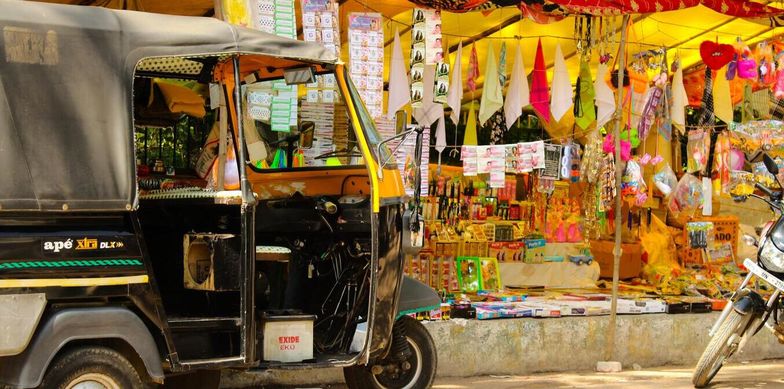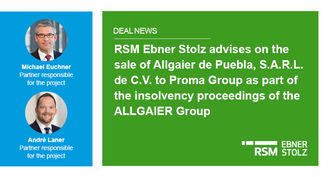PE multiples recorded an average of 15.4 times in 2021 with industries such as IT and healthcare demanding 25 times and 20 times respectively. The average PE multiples in Q1 of 2022 fell sharply to 11 times but recovered to 16.7 times in Q2 of 2022. This indicates that although 2022 global M&A activity could fall short of the activity in 2021, it could still likely be one of the strongest years of the past 20 years. This also indicates that the markets are still resilient, private equity pockets are still deep and the fundamentals of good deals still exist.
 © unsplash
© unsplashNote: See 'Global M&A Report Midyear 2022' by Bain & Company.
M&A in Germany
Although Germany started out in 2022 by keeping pace with 2021 statistics, March 2022 saw a clear decline in the number of deals with the effects of the geopolitical tensions between Russia and Ukraine, the impending inflation and the continuing supply chain problems which never resolved after the onset of the COVID-19 pandemic. According to the 'German M&A Trends', 32 deals were announced in Germany in March 2022 as against 53 in March 2021 and the overall deal value in Q1 of 2022 was 70% lower than Q1 of 2021 which indicates that although smaller deals are still on, the larger deals are becoming rarer. The potential shift in the energy and gas markets could bring about further unexpected changes as the winter approaches.
M&A in India
Datasite, a leading SaaS technology provider for the M&A industry worldwide, reported approx. 174 deals in India in Q1 2022 (28% YOY growth) alone and expects to witness continued strong growth throughout the year. As has been the case for the past decade, the Technology, Media and Telecom (TMT) industry led the M&A market at USD 11.5 billion and claimed 6 of the top 10 largest deals in the country in Q1 2022 further fuelled by the COVID-19 driven digital transformations. Currently, India is in the process of amending its anti-trust law which will require M&A deals above USD 252 million to go through an antitrust approval process if the parties in question have substantial business operations in India. In this regard, India follows suit to value-based thresholds mandated by countries like Germany (threshold of USD 407 million) and Austria (threshold of USD 204 million) as well (Bloomberg). Along with the antitrust law amendment, the Indian government is also seeking to reduce the time limit for approval of mergers to 150 days from the existing 210 days to expedite the approval process.
Indo-German M&A landscape
March 2021 marked 70 years of establishment of diplomatic relations between India and Germany. The Indian Ministry of External Affairs published a bilateral brief in April 2022 which outlines several cooperation agreements that both countries are parties to. The full content of the brief is available here. In the area of bilateral trade, Germany is India’s largest trading partner in Europe and the 7th largest FDI source for India. The ‘GIZ’ (Deutsche Gesellschaft für Internationale Zusammenarbeit (GIZ) GmbH) has been working jointly with partners in India for over 60 years to promote sustainable economic, ecological and social development. The current key focus of the partners is on renewable energies and energy efficiency. GIZ has several projects running in parallel addressing the goals of the two countries.
As far as the M&A scenario between the two countries is concerned, although the number or value of deals between Germany and India may still be a miniscule portion when compared to the global statistics, there are several meaningful investment expansions which are continuously being undertaken. Some examples are stated below.
Recent German investments in India
- In February 2022, Robert Bosch GmbH announced its intention to invest approx. USD 260 million in India over the next five years. The company further announced that half of the investment will be directed towards localisation of advanced automotive technologies and the other half towards digital platforms such as Mobility Marketplace and Mobility Cloud Platform.
- Also, in February 2022, the German packaging solution provider Multivac Group invested approx. USD 7.4 million to establish a sales and production site in Rajasthan, India. The investment is aimed at serving customers better with the regional proximity and employing at least 100 staff members from Rajasthan.
- In 2021, German automotive components manufacturer Webasto expanded its investment in Pune, India by investing approx. a further USD 34 million to set up a sunroofs manufacturing facility based on the rocketing demand for sunroofs from the customers in India and neighbouring nations.
- ZF Friedrichshafen AG, the German auto components manufacturer continues to invest in India, the latest trench being approx. USD 200 million announced in June 2021, with the intention of making India the Group’s global sourcing hub and a portion of the investment to be allocated to the tech centre in Hyderabad, India towards global R&D assignments.
Recent Indian investments in Germany
- Wipro, a leading global information technology, consulting and business process services company, set up a Digital Innovation Hub in Düsseldorf, Germany in 2020 which serves as the company’s flagship centre in Europe and offers digital transformation expertise to companies in Germany and also collaborates with universities to develop career opportunities for young graduates.
- Also, in 2020, Tata consultancy services (TCS), an IT services, consulting and business solutions organisation, acquired 100 percent shares of Postbank Systems AG from Deutsche Bank AG as part of Deutsche Bank AG’s strategic move to consolidate its IT platform for the retail banking brand with their already trusted IT services partner TCS.
- In 2019, JBM Group acquired a majority stake in Linde-Wiemann GmbH, a German auto components manufacturer, Hero MotoCorp established its first global R&D Centre near Munich and Larsen & Toubro group acquired the German IT firm Nielsen + Partner to strength its banking and financial services software segment, making it an eventful year with respect to M&A transactions.
Conclusion
An emerging trend in M&A transactions, not just between India and Germany, but also globally, has been a strong focus on sustainability and environmental protection. Across nations, governments are placing exceeding emphasis on companies and industries being more environmentally conscious and are specifying several regulations to ensure such sustainability. As a direct effect, several private equity investors / venture capitalists as well as strategic investors are interested only in those deals that comply with the sustainability requirements and those that can contribute in some manner to the social development. Targets who want to be the focus of M&A deals, therefore, need to align themselves accordingly. However, as deal making continues at a good pace, the outcome of the effects of the Russia-Ukraine war, unsettled relations between US-China, shift in energy and gas resources and unprecedented inflation rates will also define the final count of the M&A deals in 2022.
The bilingual team at Ebner Stolz brings the necessary international experience to assist you in your investment efforts in India and Germany and provide support in the areas of auditing, tax advice, legal advice and corporate advice. A recent feather to our India Desk cap has been the successful acquisition of RheinperChemie GmbH, Germany by Calibre Chemicals Pvt. Ltd., India. Ebner Stolz advised Calibre and handled the relevant financial, tax and legal aspects of this transaction and the preceding due diligence with a multidisciplinary approach from a single source. In addition to the financial, tax and legal due diligence, Ebner Stolz also supported the entire process up to the signing of the purchase agreement. Read the complete deal note here.




